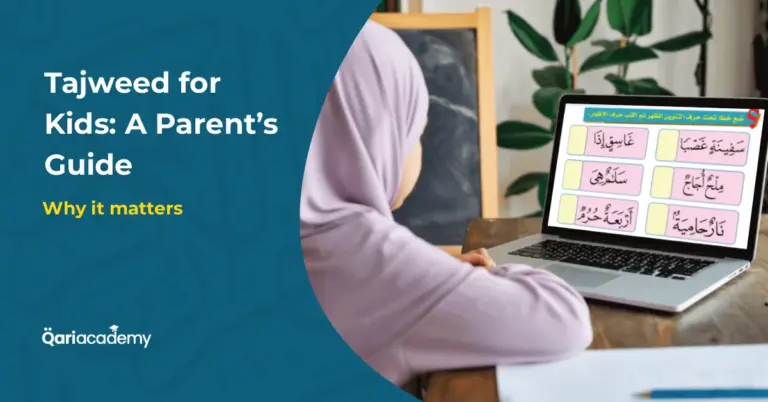
Table of Contents
Introduction
Many parents ask themselves: “Is my child too young for Tajweed?” This question comes up often when parents notice their children struggling to pronounce Arabic letters correctly or when they wonder if formal Tajweed rules are “too advanced” for young learners.
The truth is, children are not only capable of learning Tajweed at an early age, but in many cases, the earlier they start, the easier it becomes. Like learning a new language, the window of opportunity for mastering correct pronunciation is much wider in childhood than in adulthood.
In this article, we’ll explore when kids can start Tajweed, why early exposure matters, how to make it fun, and practical tips for parents who want to nurture a love for Quran recitation in their children.
Why Parents Think Their Kids Are Too Young
It’s natural for parents to worry about overwhelming their child with “rules.” Some common concerns include:
- “My child is only 5 years old, isn’t Tajweed too complicated?”
- “Won’t Tajweed make Quran reading feel boring or stressful?”
- “Maybe I should wait until my child is older and more mature.”
While these fears are understandable, research in child development—and real experiences from Quran teachers—prove otherwise. Children’s brains are wired to absorb sounds effortlessly. They mimic accents, copy songs, and repeat phrases without even realizing they’re learning rules. Tajweed can work the same way if presented naturally.
(🔗 Related: [Why Tajweed Matters for Kids: A Parent’s Guide])
The Ideal Age to Start Learning Tajweed
There is no single “perfect” age, but experts agree that ages 4–7 are golden years for introducing Tajweed. At this stage:
- Children’s ears are highly sensitive to new sounds.
- They imitate teachers and parents with ease.
- They enjoy playful learning and aren’t self-conscious about mistakes.
Some children may even start earlier—by age 3—through simple listening and repeating. Others may begin later, at age 8 or 9, and still succeed. The key is not the age itself, but how Tajweed is taught.
Why Early Tajweed Training Works
- Natural Pronunciation
Just as kids pick up their mother tongue without formal grammar lessons, they can also pick up Quran recitation patterns without memorizing “rules.” - Less Resistance
Adults often feel frustrated when correcting habits. Children, on the other hand, simply adapt. - Brain Development
Neuroscience shows that exposure to precise sounds strengthens memory and concentration skills. - Emotional Connection
Learning Tajweed young builds a bond between the child and the Quran, making recitation an enjoyable habit rather than a chore.
How to Introduce Tajweed to Young Kids
1. Focus on Sounds, Not Rules
Instead of explaining “ikhfā’” or “idghām,” simply guide your child to repeat after you or the teacher. Use fun sound effects—like a “whisper” or “bounce”—to help them feel the sound.
2. Use Stories and Imagination
Turn Tajweed into adventures:
- “The letter Ra is a strong lion—sometimes he roars (tafkhīm), sometimes he purrs (tarqīq).”
- “Letters like Noon love to play hide and seek (ikhfā’).”
3. Visual Aids and Colors
Children respond well to color-coded Qurans or flashcards. Red for long sounds, blue for nasal sounds, etc.
4. Short Sessions
Five to ten minutes of Tajweed practice daily is far more effective than one long, exhausting session.
5. Consistent Listening
Play Quran recitations from skilled qaris at home, in the car, or before bedtime. Kids will copy without realizing they’re learning Tajweed.
Signs Your Child is Ready for Tajweed
- They can clearly pronounce basic Arabic letters.
- They show interest in reciting Quran aloud.
- They enjoy rhymes, songs, and playful repetition.
- They can sit and focus for at least 5 minutes.
If your child shows two or more of these signs, they’re ready—even if they’re only 4 or 5 years old.
Common Mistakes Parents Should Avoid
- Waiting Too Long: Delaying Tajweed may cause children to form bad pronunciation habits that are harder to fix later.
- Overloading Rules: Don’t introduce every Tajweed rule at once; focus on sounds and patterns.
- Comparing Siblings: Every child has a different pace; avoid discouraging comparisons.
- Making It Stressful: Tajweed should feel like play, not punishment.
Practical Tips for Parents
- Sit with your child for Quran recitation daily, even if only for 5 minutes.
- Reward consistency with praise, not just results.
- Enroll your child in a fun, child-friendly Tajweed program.
- Model Tajweed in your own recitation—kids imitate what they hear.
Conclusion
So, is your child too young for Tajweed? The surprising truth is: most children are never “too young.” With the right approach, Tajweed can be introduced as early as preschool, turning Quran recitation into a natural and joyful part of your child’s life.
By starting early, you’re not only building correct pronunciation—you’re giving your child a lifelong gift: the ability to connect deeply with the words of Allah.
FAQs: Is Your Child Too Young for Tajweed?
1. What is the best age to start Tajweed?
Ages 4–7 are ideal, but exposure can begin earlier through listening.
2. Can toddlers learn Tajweed?
They can’t learn rules yet, but toddlers can copy sounds and rhythms through repetition.
3. Should I wait until my child knows Arabic?
No, Tajweed focuses on sounds, not vocabulary. Even non-Arabic speakers can learn it.
4. How long should Tajweed sessions be for kids?
5–10 minutes daily is perfect for young learners.
5. What if my child loses interest?
Change the method—use games, colors, or stories instead of rigid practice.
6. Can parents without Tajweed knowledge teach their kids?
Yes, by using recordings, online classes, or learning together with their child.
7. Is Tajweed necessary for understanding the Quran?
Tajweed ensures correct recitation, which preserves meaning and respect for the Quran.
8. What if my child makes persistent mistakes?
Patience is key; gentle correction and repetition work better than criticism.
9. How can I motivate my child?
Use positive reinforcement, small rewards, and make recitation a bonding activity.
10. Where can I find kid-friendly Tajweed classes?
Online academies like QariAcademy specialize in Tajweed for kids through engaging, interactive lessons.
Ready to help your child master Tajweed with confidence and joy?
Enroll your child in our interactive, kid-friendly online Tajweed program at QariAcademy. Start today and watch them develop a lifelong love for Qur’an recitation!






